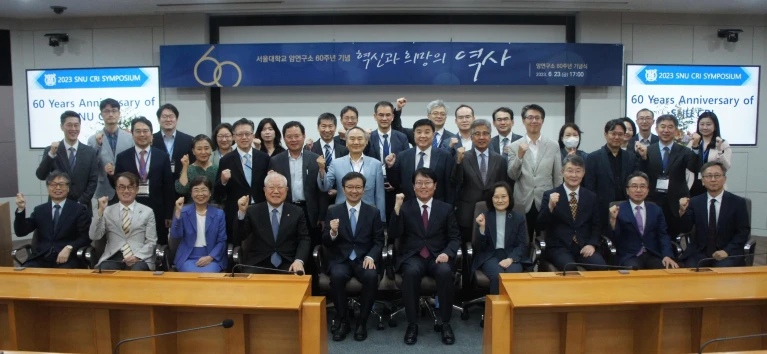
커뮤니티
공지사항
[학술] 2023 Nature Index Cancer, 암 연구 분야 서울대학교 ‘국내 TOP 1위’

© Seoul National University
Seock-Ah Im believes the combined strength of three leading institutes at Seoul National University (SNU) in the Republic of Korea is accelerating cancer discoveries.
Seoul National University Cancer Research Institute (SNU CRI) focuses on translational cancer research; SNU College of Medicine is a centre for basic research and education; and SNU Hospital (SNUH) performs clinical trials and precision treatments.
Coordination between SNU CRI and the SNUH Clinical Trial Center (CTC) has already led to groundbreaking insights into a process called ‘lineage plasticity’ in lung cancer. This process can lead to resistance to therapies using epidermal growth factor receptor (EGFR) tyrosine kinase inhibitors.1
In addition, in an effort to understand the outcome of a previous clinical trial2, a collaboration that included SNUH found that homologous repair deficiency (HRD) markers are associated with resistance to CDK4/6 inhibitors with endocrine therapy, the standard first-line treatment for premenopausal hormone receptor positive metastatic breast cancer3. The team has subsequently been investigating DNA damage repair inhibitor sensitivity using SNU cell lines with HRD. They hope to take their results to clinical trials soon.
These findings were only made possible through collaboration between SNU’s clinical team, SNU CRI and the Korean Cell Line Bank (KCLB), a world-class cell line bank based at SNU. KCLB has established more than 3,000 cancer cell lines and organoids. These contribute to more than 1,600 papers each year.
The use of KCLB is key, says Im. If patients at SNUH show extreme responses or drug resistance, researchers at CRI can ask the KCLB to cultivate sensitive or resistant cell lines from their tissue samples. These are used to explore mechanisms, as in the studies exploring drug resistance in lung and breast cancer mentioned earlier.

Seoul National University Cancer Research Institute turned 60 in 2023.© Seoul National University
When translational studies show promise, early phase, first-in-human, biomarker driven clinical trials help the team find practice-changing strategies for patients, says Im, director of SNU CRI.
Opened in 2020, SNUH’s Precision Medicine Center has marked a new era of genomic insight and patient care. The centre uses the FiRST cancer panel, SNUH’s home-grown sequencing platform incorporating RNA analysis, which helps to identify genomic mutations and fusions indicative of certain cancers or sensitivity to specific drugs. This also facilitates enrolments in early phase clinical trials, says Im.
So far, approximately 8,000 samples have been processed, with 22% leading to the identification of patients eligible to use specific drugs available at SNUH.
The results of this three-pronged approach are clear to see; In 2022-2023 the US News & World Report ranked SNU 28th globally and number one in Korea for oncology.
“Our goal is to become a leading research-oriented medical college with strong fundamental science, supported by cutting-edge clinical research, and multidisciplinary biomedical collaborations,” says Jeong Eun Kim, dean of SNU College of Medicine.
Among other things, SNU CRI, which is celebrating its 60th anniversary in 2023, is now establishing a ‘living bio-bank’ of non-frozen samples from patient-derived tumours.
“These biospecimens retain molecular characteristics that might not be replicated with cell lines, so they better reflect how a cancer patient would respond to targeted treatments,” explains Im. This resource will put SNU’s cancer hub in the perfect position to accelerate discovery and treatment into the next decade, she says.
SNU CRI and the SNU also host an Interdisciplinary Cancer Biology Graduate Course in which PhD candidates study preclinical and clinical work, as well as specific molecules and pathways. Learn more about SNU College of Medicine and SNU CRI.
Nature Index Tables 2023 :
Cancer (nature.com)
